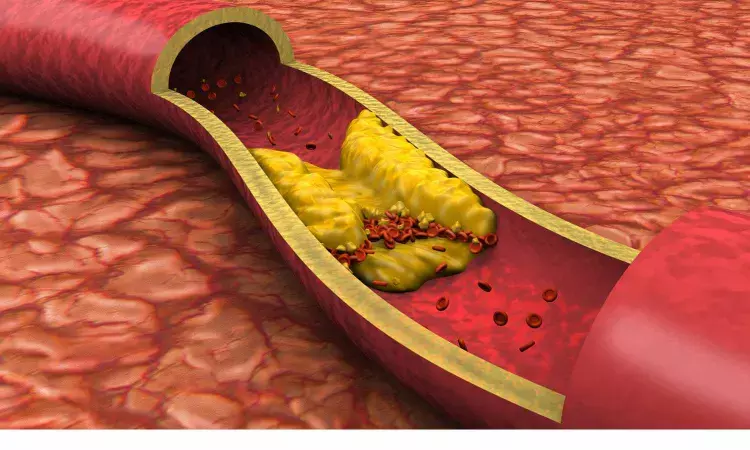- Home
- Medical news & Guidelines
- Anesthesiology
- Cardiology and CTVS
- Critical Care
- Dentistry
- Dermatology
- Diabetes and Endocrinology
- ENT
- Gastroenterology
- Medicine
- Nephrology
- Neurology
- Obstretics-Gynaecology
- Oncology
- Ophthalmology
- Orthopaedics
- Pediatrics-Neonatology
- Psychiatry
- Pulmonology
- Radiology
- Surgery
- Urology
- Laboratory Medicine
- Diet
- Nursing
- Paramedical
- Physiotherapy
- Health news
- Fact Check
- Bone Health Fact Check
- Brain Health Fact Check
- Cancer Related Fact Check
- Child Care Fact Check
- Dental and oral health fact check
- Diabetes and metabolic health fact check
- Diet and Nutrition Fact Check
- Eye and ENT Care Fact Check
- Fitness fact check
- Gut health fact check
- Heart health fact check
- Kidney health fact check
- Medical education fact check
- Men's health fact check
- Respiratory fact check
- Skin and hair care fact check
- Vaccine and Immunization fact check
- Women's health fact check
- AYUSH
- State News
- Andaman and Nicobar Islands
- Andhra Pradesh
- Arunachal Pradesh
- Assam
- Bihar
- Chandigarh
- Chattisgarh
- Dadra and Nagar Haveli
- Daman and Diu
- Delhi
- Goa
- Gujarat
- Haryana
- Himachal Pradesh
- Jammu & Kashmir
- Jharkhand
- Karnataka
- Kerala
- Ladakh
- Lakshadweep
- Madhya Pradesh
- Maharashtra
- Manipur
- Meghalaya
- Mizoram
- Nagaland
- Odisha
- Puducherry
- Punjab
- Rajasthan
- Sikkim
- Tamil Nadu
- Telangana
- Tripura
- Uttar Pradesh
- Uttrakhand
- West Bengal
- Medical Education
- Industry
Pregnant women with preexisting high cholesterol may have elevated CV risk, reveals study

Preexisting hyperlipidemia in pregnancy is associated with heightened risks of obstetric complications and early cardiovascular events in the first five-years postpartum, according to a new study being presented at ACC’s Cardio-Obstetrics Essentials: Team-Based Management of Cardiovascular Disease and Pregnancy conference. The researchers call for clinicians to incorporate lipid screening into preconception care and closely monitor women with hyperlipidemia during and after pregnancy.
“Pre-pregnancy hyperlipidemia is not just a metabolic concern; it is an early signal of increased long-term maternal health risk,” said Srijana Maharjan, MD, the lead author of the study and an internal medicine resident at Allegheny General Hospital in Pittsburgh.
Hyperlipidemia (high cholesterol) occurs when there is an excess of lipids or fats in the blood, restricting the blood flow through the arteries and increasing the risk of heart attack or stroke. Historically considered a midlife condition, high cholesterol has become more common among younger women in response to the rising rates of metabolic syndrome, obesity and sedentary lifestyles.
“The study aimed to evaluate whether women with pre-pregnancy hyperlipidemia face higher risks of adverse cardiovascular and obstetric outcomes compared to women without hyperlipidemia. Specifically, the team wanted to assess these risks over a five-year postpartum window, using a large U.S. multi-institutional dataset and rigorous propensity score matching to control for demographics and comorbidities,” Maharjan said.
The authors used the TriNetX U.S. Collaborative Network to identify more than 10,000 women with pre-pregnancy hyperlipidemia across 66 U.S. health care systems. Participants included pregnant women with hyperlipidemia ages 18 years old or older between 2000-2020.
The results found that women with high cholesterol had higher risks of arrhythmia, acute coronary syndrome, antepartum hemorrhage, gestational diabetes, labor and delivery complications, and hypertensive disorders of pregnancy. However, the authors did not note any significant differences in postpartum hemorrhage and maternal mortality risks.
“Some outcomes were expected (higher risk of gestational diabetes and hypertensive disorders), but the clear link with arrhythmias and acute coronary syndromes within just five years postpartum was striking. It highlights that cardiovascular sequelae can manifest much earlier in this population than previously assumed,” she said.
There are several factors that could contribute to these higher risks of obstetric complications and early cardiovascular events among women with high cholesterol. Higher lipid levels can accelerate atherosclerosis and weaken vascular reactivity, making patients more susceptible to cardiovascular complications like arrhythmias and acute coronary syndromes, the authors said. High cholesterol is associated with chronic systemic inflammation and promotes a hypercoagulable state or increased risk of developing blood clots, which could link to elevated risks of antepartum hemorrhage or obstetric embolism.
“Obstetricians, internists and cardiologists should collaborate to integrate lipid management into preconception and prenatal care,” Maharjan said.
Before conception, young women could benefit from early lifestyle interventions and preventive therapies. Further research is needed to confirm whether lipid-lowering interventions, such as diet, exercise, or statin therapy, before or during pregnancy could mitigate these risks.
Dr Kamal Kant Kohli-MBBS, DTCD- a chest specialist with more than 30 years of practice and a flair for writing clinical articles, Dr Kamal Kant Kohli joined Medical Dialogues as a Chief Editor of Medical News. Besides writing articles, as an editor, he proofreads and verifies all the medical content published on Medical Dialogues including those coming from journals, studies,medical conferences,guidelines etc. Email: drkohli@medicaldialogues.in. Contact no. 011-43720751


